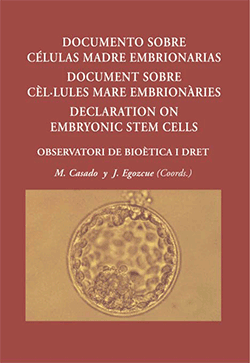The Bioethics and Law Obs.
Master in Bioethics and Law
Master in Food Ethics and Law
UNESCO Chair in Bioethics
Contact
- Bioethics and Law Observatory
- UNESCO Chair in Bioethics
- University of Barcelona
- Faculty of Law
- Ave. Diagonal, 684
- 08034 Barcelona
- (+34) 93 403 45 46
- obd.ub@ub.edu
- Master in Bioethics and Law
- (+34) 93 403 45 46
- master.bd@ub.edu
The OBD expresses its support for the production of embryonic stem cells for therapeutic purposes
 In response to the controversy that has recently arisen about the use of human embryos for therapeutic and non-reproductive purposes, the Opinion Group of the Observatory on Bioethics and Law of the Barcelona Science Park has drawn up a Declaration on this issue. This document provides information and several view points with the aim to facilitate public debate on this question. It also provides guidelines for the government and legislative bodies for possible future modification of current legislation in Spain.
In response to the controversy that has recently arisen about the use of human embryos for therapeutic and non-reproductive purposes, the Opinion Group of the Observatory on Bioethics and Law of the Barcelona Science Park has drawn up a Declaration on this issue. This document provides information and several view points with the aim to facilitate public debate on this question. It also provides guidelines for the government and legislative bodies for possible future modification of current legislation in Spain.
The “Declaration on Embryonic Stem Cells” was made public yesterday in a press conference held in the Barcelona Science Park. This Declaration aims to reassure the public, and protect the use of embryos for therapeutic purposes from the negative connotations of clonation for reproductive purposes.
The use of embryos for non-reproductive purposes aims to produce tissues or even organs from the so-called stem cells. This could then lead, for example, to the production of neurones to treat neurodegenerative diseases such as Alzheimer’s or Parkinson’s, pancreatic islets for the treatment of diabetes, or for use in repairing heart tissues necrotised because of myocardial infarction. Using nuclear transplant techniques, the tissues and organs obtained in this way could minimize the risk of rejection because they would be manipulated to incorporate the genes of the person affected. Therefore each individual could have his or her own line of stem cells, leading to what scientists refer to as the medicine of the future.
However, there are several ideological points of view that oppose this research, arguing that the embryo is a person that cannot be used, even if it is to benefit many others.
The Observatory upholds that it is immoral not to use the possibilities that are currently available, bearing in mind that to produce embryonic stem cells it is only necessary to culture the pre-embryo to 5 days post-fertilization.
Curiously, a double moral with respect to this issue can be observed in many countries. This is a situation whereby the authorities prohibit therapeutic clonation while at the same time allow, and even finance, research on cell lines obtained from human embryos provided by other countries.
In this context, the Observatory advocates the amendment of the current legislation and upholds the production of embryonic stem cells for therapeutic and research purposes, but always when approved by an ad hoc committee. The Observatory proposes that this committee evaluates the coherence of the protocols and determines their suitability, assuring that identical results cannot be obtained using stem cells from other sources. These committees should be made up of professionals from multidisciplinary fields, able to reach a consensus, from juridical and deontological points of view and on the rules of good professional practice.
Once the protocol has been approved, the researchers can carry out their lines of investigation with embryos obtained from:
1. Surplus embryos donated for scientific research.
2. Embryos created in vitro, which, for various reasons, are considered non-transferable.
3. Frozen embryos that have exceded the legal limit for cryopreservation. These embryos are created for reproductive purposes, but, having exceeded this legal limit are no longer considered legally viable and can be used for research, unless the progenitors have explicitly objected to such use.
4. Somatic embryos obtained by means of nuclear transplantation techniques.
5. Gametic embryos created to produce stem cells using human gametes. This option is only recommendable when it is not possible to use the embryos described above.
In all of these cases, the Observatory considers it necessary to obtain informed consent from the donors.
Financed by the “Fundació Mª Francesca Roviralta”, coordinated by Josep Egozcue, specialist in human reproduction, and by Maria Casado, jurist and Director of the Observatory on Bioethics and Law, this Declaration is the result of pluridisciplinary dialogue between professionals from around Spain. It encompasses technical, scientific, ethical, philosophical, cultural-anthropological, legal and health aspects of this issue.
The presentation of this Declaration to the public will be held on Wednesday 19th December at 20:00 h in the auditorium of the Barcelona Science Park and will be presided by Joan Guinovart, director general of the Park. This presentation has been supported by the Barcelona Science Park and the Barcelona City Council.
- Document [PDF]




